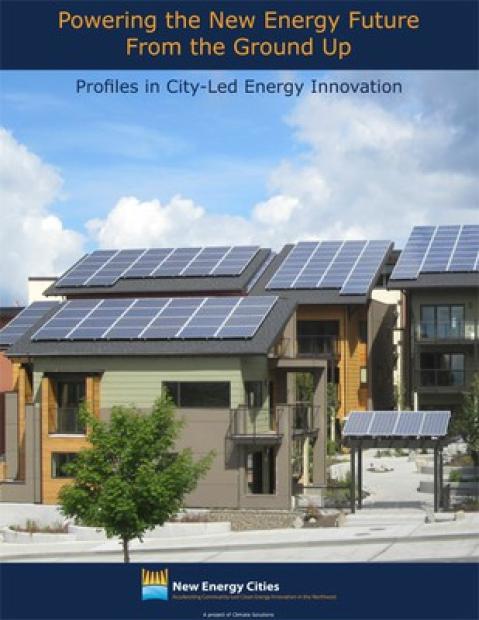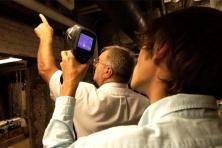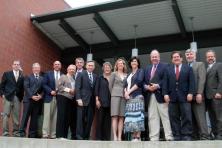Four years ago, Babylon, NY faced a challenge: where to find funding for much-needed energy-efficiency retrofits. The Long Island town devised a creative solution—pass a policy expanding the definition of solid waste to include carbon emissions to tap its solid waste fund to pay for the retrofits.
"We wanted to make a program that bridged the gap for homeowners and financing for retrofits,” said Will Schweiger, Operations Manager, Long Island Green Homes in the town of Babylon. “The results speak for themselves that we hit the nail on the head with what people needed."
The town also passed one of the most ambitious green building codes in the US; created a Green Certificate of Occupancy to designate energy efficient homes; and elevated the skill level of the local home performance industry by providing training opportunities. The Long Island Green Homes program now results in savings of $1,000 per year (or 20-40 percent in monthly utility bills) for the average Babylon resident and, as of 2011, supports 50 full-time jobs. The program has expanded to a seven-city consortium across Long Island.

The Town of Babylon and close to three dozen others are featured in Powering the New Energy Future from the Ground Up, a report released today by Climate Solutions, a Northwest-based clean energy economy nonprofit. The publication describes how U.S. communities from Bellingham, WA to Knoxville, TN are pioneering a wide range of clean energy solutions in energy efficiency, renewable energy, electric vehicles, and carbon-reducing transportation strategies.
“These communities show us that small can be powerful,” said Eileen V. Quigley, report co-author and New Energy Cities Program Director. “Through trial and error, communities are breaking down barriers, testing marketing strategies to drive demand for efficiency and clean energy programs, and creating finance mechanisms that can serve as models for other communities.”
As the United States climbs out of the Great Recession, one source of economic promise is the hard work that small- and medium-sized cities are doing to catalyze local clean energy economic development. These cities and towns have committed staff time and political leadership to develop partnerships with utilities, private entities, and community groups to advance the use of energy efficiency, renewable energy, electrified transportation, commute trip reduction, and smart grid integration.
They are also setting up sustainable business models to survive after federal grants sunset and developing long-term relationships with workforce development institutions to create high-quality, living-wage jobs.
“We partnered to provide a one-stop shop for energy efficiency services,” said Alex Ramel, Energy and Policy Manager for Sustainable Connections in Bellingham, WA. “Our program is trying to do two things: save energy and create jobs. To date, we’ve saved $300,000 as a community and supported 84 positions.”
The sources of funding for these efforts were diverse. Many cities used federal grants, including funds issued under the American Recovery and Reinvestment Act, to jumpstart long-term strategies for clean energy and energy efficiency. Others, such as Boulder, CO and Jackson, WY developed innovative financing strategies in the absence of grant money altogether.
Communities profiled in the report: Babylon, NY; Bainbridge Island, WA; Bellingham, WA; Boulder, CO; Eugene, OR; Ft. Collins, CO; Hailey, ID; Jackson, WY; Knoxville, TN; and Oberlin, OH.
Communities with projects featured in the report: Bedford, NY; Bremerton, WA; Burlington, VT; Gainesville, FL; Hillsboro, OR; Issaquah, WA; Madison, WI; Pendleton, OR; Salt Lake City, UT; Sante Fe, NM; West Union, IA; and Williamson, WV.
Communities with projects to watch for future results: Aiken, SC; Charleston, SC; Columbia, MO; Corvallis, OR; Dubuque, IA; El Cerrito, Albany, Piedmont and San Pablo, CA; Grand Rapids, MI; Greenfield, MA; Keene, NH; Little Rock, AR; Palo Alto, CA; and Richmond, CA.
The Seattle, WA-based Henry M. Jackson Foundation funded Powering the New Energy Future from the Ground Up to examine and share examples of city-led clean energy innovation so that other cities throughout the country might learn from and emulate these early adopters.The future of these city-led efforts will become all the more important to watch if the U.S. Congress continues to avoid passing a comprehensive energy or climate policy.
"People can't imagine a different world until they see it. When they see it, light bulbs go off," said Craig Gannett, Vice President of the Henry M. Jackson Foundation. "With congressional legislation stalled, perhaps for years, American ingenuity and innovation is happening in town halls across the country. These examples of clean energy innovation will inform and inspire other cities throughout the country.”
Climate Solutions’ New Energy Cities team conducted the research for the report, examining a diverse set of 34 communities with populations under 250,000. Download the report here.
New Energy Cities works with small- to medium-sized Northwest communities to accelerate the transition to a clean, renewable, super-efficient energy system that integrates smart grid technology, green intelligent buildings, electric vehicles, and renewable power. New Energy Cities is a project of Climate Solutions.
Climate Solutions is a Northwest-based clean energy economy nonprofit that works to accelerate practical and profitable solutions to global warming by galvanizing leadership, growing investment, and bridging divides. Since 1998, Climate Solutions has pioneered the vision and cultivated political leadership in the Northwest for the proposition that clean energy and broadly shared economic prosperity can go hand-in-hand. Through its New Energy Cities, Business Leaders, Northwest Biocarbon Initiative,and Harvesting Clean Energy programs, Climate Solutions builds a powerful constituency for local, regional, and national action on climate and clean energy.
Henry M. Jackson Foundation was founded in 1983 to continue the unfinished work of the late Senator Henry M. “Scoop” Jackson in the fields in which he played a key leadership role: international affairs education, human rights, environment and natural resources management, and public service. Through its grantmaking and strategic initiatives, the Foundation seeks to make a lasting impact and perpetuate the Jackson legacy for the benefit of future generations.




